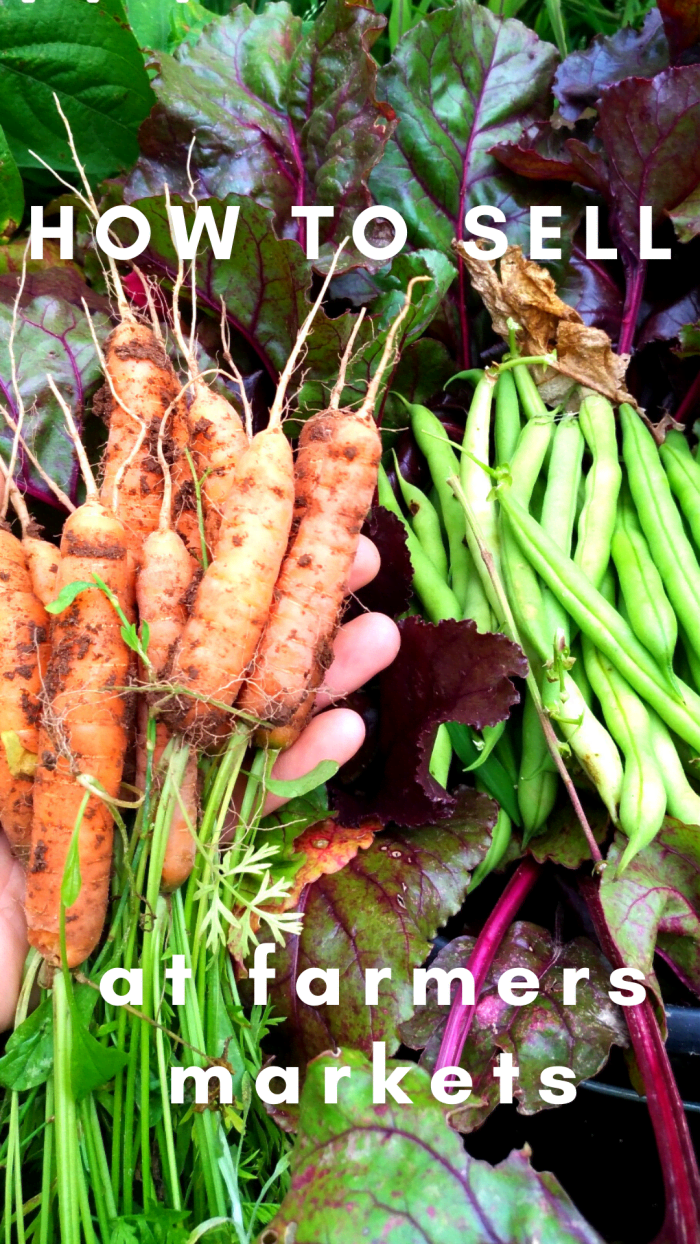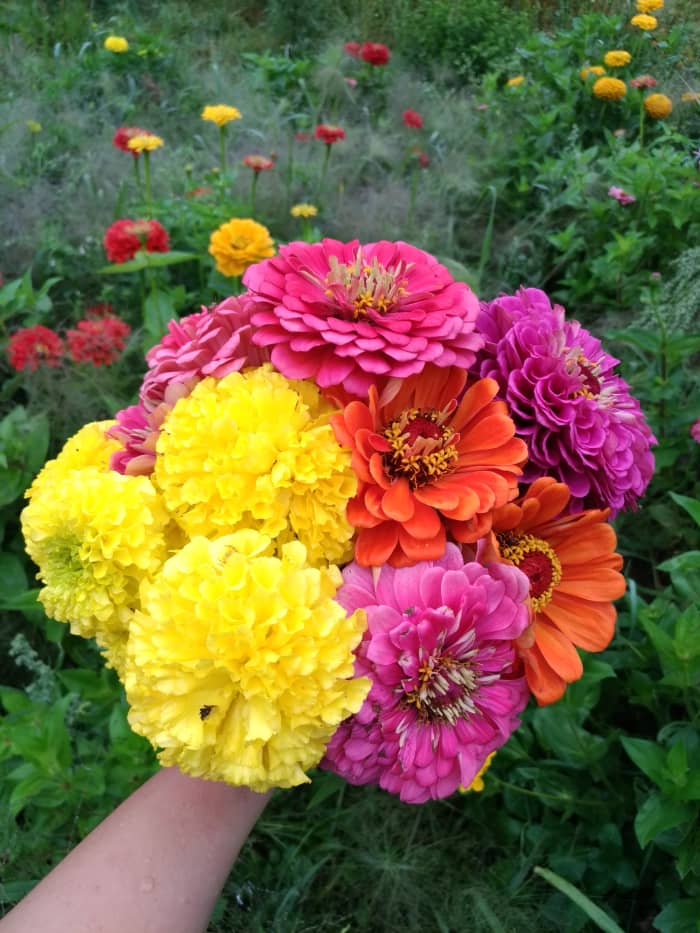Fun Easy Things to Sell at the Farmers Market
Rachel worked as a farm manager for three years in Pennsylvania and now has her own farmstead in Minnesota.

This guide will provide you with all sorts of information on how to sell your produce and goods at a farmers market.
Farmer Rachel
What to Sell at Farmers Markets?
I love farmers markets. Whether I'm a customer or a vendor (or both in one day) I just love the environment a good market creates. I've sold veggies and fruits, cuts of meat, handmade soap, berries, tanned sheep hides, flowers, eggs, and more at market. I've also sold orders for half or whole hogs when we were raising pigs, and whole lambs when we were raising sheep.
If you've come to this article, you likely already have an idea in mind of something you want to try to sell at a farmers market. Is your garden overflowing with veggies and your co-workers don't want anymore? Maybe you've gotten into a new hobby crafting homemade soaps or spinning wool, and you need an outlet for all your extras. These are great products to bring to a farmers market.
The simple answer to the question "what can I sell at a farmers market" is "whatever the market's rules allow you to sell"!
It is important to know what the rules are and follow them. For example, at markets I've sold at, meat cuts were allowed but only if processed by a butcher with a special license, but that's not always the case. It's a common rule that you can only sell what you or your farm/business has produced. At one of my markets, vendors could sell baked goods with the proper food preparation license, but at another market I sold at, this was not allowed.
Common Goods Sold at Farmers Markets
- Produce: fresh vegetables, fruit, & berries
- Meat: frozen whole chickens & turkeys, cuts of beef, pork, lamb
- Flowers, cut and potted
- All varieties of potted plants and seedlings
- Homemade baked goods and canned goods, with the proper license
- Handmade "homestead" crafts such as soaps, lotions, candles, and animal fiber items (I sold tanned sheepskins!)
- Animal fibers such as wool (raw or spun)
- Honey and maple syrup
- Eggs from chickens, ducks, etc.

I love growing and selling cut flowers.
Farmer Rachel
Find and Join a Local Farmers Market
Finding farmers markets in your area could be surprisingly tricky. You may need to travel farther if you're in a very rural area. Or, you may already be familiar with one or more that you'd like to sell at.
If you're having trouble finding a farmers market, social media sites like Facebook and Instagram could be helpful. If you're in the US, you can also contact your county agricultural extension office, or check out their website. There's also the option of asking locals in the area you want to sell in.
Joining a farmers market as a vendor is a pretty simple process in my experience. You usually need to contact the market manager and tell them you want to become a vendor. You'll then fill out any forms they require, usually involving declaring what you want to sell, the name of your business, and how large of a booth or site you want. Expect to pay a fee for the season, which will be entirely up to the market management but shouldn't break the bank—think maybe $50–$150.
Deciding what market to sell at is up to you. You might choose the one in your own town, even if it's rather small and perhaps not the most bustling! There are advantages to starting out at smaller markets.
Alternatively, you might choose large, well-established farmers markets in cities. You may find more customers in this setting.
Small vs. Large Farmers Markets
| Small Markets | Large Markets |
|---|---|
| less competition from other vendors | lots of vendors and overlap of goods |
| local support from people who know you | possible anonymity |
| less customers attending | greater numbers of potential customers |
| less overhead in fuel costs and fees | market might cater to higher income earners |
Supplies for Selling at a Farmers Market
One of the things I loved most about market days was the rush to set up the tent and tables. I really enjoy arranging things to look nice and got serious satisfaction from writing all my offerings with their prices on the whiteboard we hung from our tent.
You do need to have a few things besides your goods for sale when you go to market! I'd say the following are necessary:
Scroll to Continue
Read More From Dengarden
- Table(s) and chair to sit at
- A tent (provides shade and rain protection!)
- A sign for prices (I love whiteboards and chalkboards)
- Labels for your produce and other goods
- Coolers with ice if you're selling anything that shouldn't be in the heat
- Something to keep cash in (money pouch, envelopes, etc.)
- Anything else the market requires you to have, such as a displayed license
And the following are optional but good ideas:
- Recipes or cooking directions for the veggies, fruit, and/or meat you're selling (I typed up little cards for a few things)
- Tablet or iPad if you use a credit/debit card app or your market allows WIC/EBT
- Table cloths and other aesthetic pieces to make your table look more inviting and professional
- Information about your farm/business (cards, website info, order forms, etc.)

If you're having trouble determining what to charge for your goods at the market, try talking to other vendors to see how they set their prices.
Farmer Rachel
Deciding Your Prices at the Farmers Market
Setting prices for the goods you'll sell at market is, in my experience, one of the most difficult things to figure out. And I think most farmers, market gardeners, and other vendors would agree with me!
There are different ways to go about deciding the price tags on your goods.
1. Benchmarking is matching your prices to those of other sellers.
This is an easy way to set your prices, especially initially, but may not be the best for you depending on your goals. The prices set by other vendors may bring them profit, but might not do the same for you. If you don't need to make a profit on your goods, or you're just getting yourself established at market, this is probably a pretty safe way to go.
2. Analysis of your production costs means determining what it costs you to create your products and setting prices based on your costs plus a profit margin.
Using this method, you'll have to figure out what it cost you to grow those tomatoes or produce that sack of raw sheep wool, and then decide what profit margin you need in order to actually have a successful business. This is obviously trickier than benchmarking.
You may find that some of your products can't be profitable because of their cost to create, and this can be frustrating as you realize you'll need to make changes to your production methods. You may find that consumers at your market simply aren't willing or able to pay a higher price, which could mean a particular item you're trying to sell isn't a good fit for that market.
But if you're trying to make money, this method is the place to start.
3. Talk to other vendors about how they set prices.
This is similar to benchmarking, but you'll get more insight than you would with simple observation. You may learn that some vendors will sell a certain product exactly at cost because this helps them sell another product for a really good profit.
You can also gain insight this way into what value the market customers place on certain foods. People are usually willing to pay far more for local and/or organic produce than they'll pay for what they find in the grocery store. You may be surprised to find that some goods will sell far above their cost to produce.
Will I Make Money Selling Things at a Farmers Market?
Well, people certainly do! And I'm of the mind that one person can do what another person can do. It's impossible to predict for sure whether you can turn a profit selling at farmers markets because there are so many factors and risks involved.
You can give yourself a chance to make money by doing your research and being prepared!
If you're selling casually, my advice would be to focus on recouping your own costs and having fun.
And if you're starting a farm, market garden, or other small business that will rely on proceeds from farmers market sales to stay afloat, remember that you shouldn't expect to make money the first year or two. Be ready to hold fast!

A bunch of beautiful items being sold at a local farmers market.
Farmer Rachel
This content is accurate and true to the best of the author's knowledge and is not meant to substitute for formal and individualized advice from a qualified professional.
© 2021 Rachel Koski Nielsen
Source: https://dengarden.com/misc/How-to-Sell-at-Farmers-Markets
Post a Comment for "Fun Easy Things to Sell at the Farmers Market"